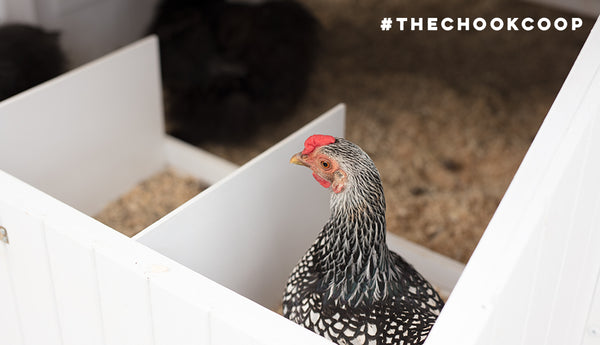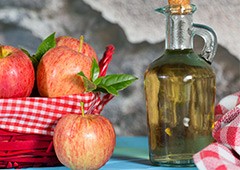If you’ve been keeping chickens for more than a few months in all likelihood you would have come across diatomaceous earth in one form or another. Ahem! What? Diatomaceous (pronounced: di-a-tom-aye-shus) earth is a fabulous poultry accessory that many Chicken Ladies are buying by the truckload! And why wouldn’t they? The benefits are really something special. If you want your chickens to lead healthy, happy and pest free lives, then diatomaceous earth is really a must have for anyone who owns a coop and has a flock full of fine feathered friends.
What is diatomaceous earth?
In an eggshell, food grade diatomaceous earth is essentially finely ground and processed fossilized algae. Yes, you read that correctly - fossilized algae. Odd though it may seem, fossilized algae, often referred to as diatoms, contain a highly beneficial chemical compound called silica, which makes up 26% of the Earth crust’s weight – so it really is everywhere! What people don’t know about silica and processed diatoms – diatomaceous earth – is that they have a whole array of benefits for your poultry’s health; from treating worms to eradicating mites and lice. This happens because the diatoms are essentially very fine, sharp and abrasive particles that eliminate parasites by drying out the natural oils and fats on their exoskeletons, which causes them to shrivel up and perish relatively quickly. No yolk – it’s pretty impressive stuff! The good news there is no significant risk of diatomaceous earth having the same effect on you, your chickens, or anything else larger than a mite.
What are the different varieties of diatomaceous earth?
To put it simply, all diatomaceous earth is made from essentially the same base elements – diatoms – however the processes used when manufacturing it can change the way you use the product. The diatomaceous earth we recommend on Backyard Chicken Coops is 100% natural, chemical free and Australian made, making it an incredible safe and versatile product. So long as the diatoms are processed in a safe and natural way, the only key difference between different varieties is the coarseness of the ground. Basically, depending on how you intend to use the product, diatomaceous earth can be ground at different levels for optimum use. For example, the diatomaceous earth for poultry use is ground between 0.5 to 2 mm, making it easy for chickens to ingest, whereas the same product for agricultural use can be as large as 10 mm per particle. So, if you’re a chicken lover, the choice is pretty simple.
What does diatomaceous earth actually do?
By now you’re probably wondering why so many Chicken Ladies swear by diatomaceous earth. Well, the benefits are pretty straight forward and very impressive. Here are some things you can expect when implementing diatomaceous earth into your coop and your flock’s diet…
Exterminate mites and lice: One of the most popular uses for diatomaceous earth is to treat mite and lice infestations in a flock. Chicken lovers simply sprinkle diatomaceous earth in and around the coop, which will gradually help exterminate mites and lice. Basically the diatomaceous earth simply causes these pests to dry out, shrivel up and die fairly quickly. It’s sort of like that scene from ‘Indiana Jones: Raiders of the Lost Ark’, when the ark is opened and all the villains are perished – pests and parasites are no match for diatomaceous earth.
Natural worming remedy: That’s right, feeding your chooks diatomaceous with their feed is an eggcellent way to prevent and treat worms. In the same way diatomaceous earth kills parasites outside of the body it will also eradicate worms at the source – inside your chickens stomach and bowels. This may sound rather intense, but diatomaceous earth is in fact one of the most natural and harmless ways to treat worms and is no risk to you, your family, your chickens or any other pets that might be wandering around in the backyard. The only creatures that need to be on the look are parasites.
Puts an end to ‘fowl’ smells: Diatomaceous earth actually helps eliminate all those pungent odours that can sometimes build up in your coop. By simply integrating diatomaceous earth into your regular cleaning routine in your coop, it will help fight against all those familiar but occasionally unpleasant chicken smells. Sprinkle it in the nesting boxes, on the cleaning trays, in the bedding – a little diatomaceous earth everywhere and anywhere can always help.
No more ants in your pants: If you don’t like ants creeping and crawling around your backyard then diatomaceous earth is the solution for you. As well as warding off all other sorts of nasty critters that plague your chooks, diatomaceous earth also can deter ants from your garden. So, if you’re sick of seeing ants crawling around the coop, inside the feeders and waterers, it might be time for you to get your hands on some diatomaceous earth.
A healthy diet supplement: Diatomaceous earth is also a rich source of a number essential minerals that will have your chooks laying at their best! The recommended amount of diatomaceous earth changes depending on which brand and variety you buy, but generally speaking it can make up 5-15% of your chickens diet. At Backyard Chicken Coops we stock a brand of diatomaceous earth that can make up 15% of your flocks diet.
So, now that you know all the benefits of using diatomaceous earth, all you need to do is find out how you can use it! Read on…!
How do I use diatomaceous earth?
Diatomaceous earth is a very versatile material and there really is no serious need to be cautious in the way that you use it. That’s right – so long as you’re not an insect, feel free to scatter, sprinkle and splash diatomaceous earth all over your coop and garden. Regular inhalation of diatomaceous can cause problems for people with pre-existing conditions, so please consult your doctor if you have any doubts. Have a read of some of the different ways you can use this wonderful product…
Mix it in with the chicken feed: It may seem counter intuitive to mix diatomaceous earth into your chicken feed, but believe me your girls will love it! Not only does it help treat and prevent a number of nasty parasites, it also is a rich source of many essential minerals, which will leave you girls feeling in top form.
Sprinkle it around the coop: Distributing diatomaceous earth around the coop inadvertently has a number of benefits for your flock. As mentioned previously, diatomaceous earth will help eradicate parasites both inside your chickens’ bodies and inside the coop itself. Also, it’s a great way to put an end to those 'fowl' odours. So, let your inhibitions slide and feel free to rub diatomaceous earth along the roosts, sprinkle some inside the nesting boxes and all over the coop floor - the benefits of diatomaceous earth can be felt everywhere and anywhere inside your coop!
Great for dust bathing: Many Chicken Ladies are aware that dust bathing is an essential part of any flock’s lifestyle. Dust baths are essentially the natural way your chickens help fight and prevent parasite and pest infestations – that right, they roll around in the dirt to get clean! However, if you can strategically place the diatomaceous earth wherever you suspect you ladies will have their dust baths, the benefits will be enormous! Imagine diatomaceous earth as a soothing bath bomb that you can add to your ladies personal hygiene routine.
At the end of the day, you don’t need to be overly cautious in how you use diatomaceous earth. Your chickens can eat it, roll around in it, even bathe in the stuff and it will only render positive results. Of course, please be cautious if you suspect it may be having a negative impact on your health and immediately consult your doctor. Other than that feel free to grab a bag and get sprinkling!

Are there any disadvantages to using diatomaceous earth?
There are of course a few things that will affect the overall usefulness of diatomaceous earth that you need to be aware of. Here are some things to consider if you’re using diatomaceous earth for the first time.
Rain can dampen the benefits: Unfortunately diatomaceous earth becomes less effective when wet. Please bare this in mind and the scatter the product in and around your coop. If you want to preserve your stash, it might be best to only use it inside the coop, as well as in the flock’s chicken feed.
A “no-no” with a deep litter system: Unfortunately diatomaceous earth does not pair well with a deep litter system. The good parasites that a deep litter system fosters will sadly be eradicated by diatomaceous earth. In other words, diatomaceous earth is unable to determine the good parasites from the bad parasites and as a result a deep litter system simply won’t work.
Be cautious if you have a lung condition: If you have a sensitive lung condition please exercise caution when using diatomaceous earth, as it may unnecessarily aggravate your condition. Diatomaceous earth will not have any negative effects on most of the population, however its best to exercise caution if you know you’re vulnerable. In this even, simply wear a face mask and glove when you distribute the product or get someone else to do it for you – too easy!
All things considered though for the average chicken lover diatomaceous earth will only improve the health and happiness of your flock! Of course if you live in a wet area, keep a deep litter system or have a pre-existing lung condition, you will need to be more strategic in how you implement diatomaceous earth.
Diatomaceous earth is really a remarkable poultry product for any chicken lover!
As chicken keepers, we like to think that we are doing the best we can for our girls, however, there is often more we can do to prevent health issues. I highly recommend the online chicken keeping course titled Ultimate Chicken Health to all my readers! It is written by our friends over at Chickenpedia. They have compiled everything you need to keep healthy chickens through the seasons (which is more than you think!) with a great set of check-lists and downloads to keep.


















